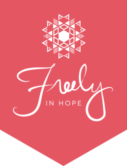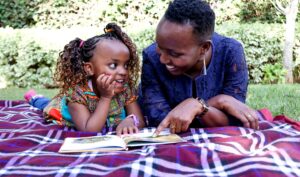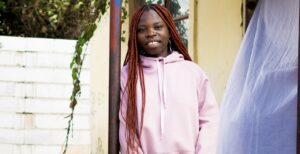(Interview with Social Impact Yodas)
Empowering Survivors to End Sexual Violence
We recently interviewed Nikole Lim, the International Director and founder of nonprofit Freely in Hope. With programs in Kenya and Zambia, Freely in Hope equips survivors and advocates to lead in ending the cycle of sexual violence. Freely in Hope has a three-tiered program of holistic education (through scholarships), leadership development, and storytelling platforms. Nikole founded Freely in Hope at age 20, and as its International Director, she leads the organization’s staff development, fundraising, and implementation of new program initiatives.
Nikole is releasing her first book, Liberation Is Here: Women Uncovering Hope in a Broken World, on September 22nd, available for pre-order here.
Q: What inspired you to start Freely in Hope?
N: As a documentary filmmaker, I traveled in and out of countries to meet people briefly to collect stories for my short-term assignments. I befriended women who were survivors of sexual violence (SV) in Kenya, where I filmed my thesis film (I was in a college program for film production), and observed these women fighting against cultural and familial oppression simply for being born a girl, in order to go to school. All these women desired was to use their education to ensure other girls vulnerable to SV wouldn’t endure the same pain. I began to observe a correlation between SV and the lack of access to education.
As I edited my thesis documentary film, I felt God asking me, what are you going to do about it? The film I was making would build awareness of SV through storytelling, but simply telling their stories was not enough. I was so inspired by the beauty, compassion and community orientation of their dreams, that I wanted to contribute tangibly to helping achieve them. I started to think about founding a nonprofit for this purpose, but I didn’t know how to start one from scratch. I had to Google it. And this was the beginning of Freely in Hope.
Q: How has Freely in Hope evolved over time?
N: We began by providing scholarships for a couple of girls to attend high school and university. After receiving their first scholarships, these girls rose to the top of their class. We soon began supporting other survivors. The girls shared that, now that they were in school, they realized the power of their voices and they wanted to educate their communities about SV prevention. They wanted to become leaders in the fight for justice. We built out our programs into the three tiers that we have now, based on their guidance, feedback, and dreams. We pride ourselves as being an organization for survivors, led by survivors, designed by survivors. All of our program staff are survivors of SV. We hope to build a strong support system for young women who believe that they can transform systems of oppression into places of freedom and liberation for all women.
Q: What do you find fulfilling about your work?
Our survivors, both scholars and staff, recognize the power of their voice. These are huge milestones when they lead a meeting for the first time, tell their story for the first time, or recognize for the first time how a trigger was connected to a past trauma. It is incredibly fulfilling to observe how these moments lead towards transformation.
When they first join our program, many survivors can’t even say their own names because there’s so much shame and trauma attached to their identities due to rape, incest, and violence. They lost a sense of who they were. Through Freely in Hope, they go through a process to reclaim their identities, to the point that they can say their names publicly and tell their stories in front of others.
Q: What challenges have you encountered in your work?
N: The biggest turning point in my leadership was when I burned out in my third year with Freely in Hope. I felt it was personally up to me to pursue this mission of ending sexual violence, and that I had to control all our organizational outcomes in order to succeed. I ended up hospitalized in Zambia due to the stress: I was physically ill, unable to sleep, and had migraines.
In the hospital I came to terms with my lack of control. I wasn’t God. I also realized that I was suffering from secondary PTSD and through my recovery, I began to recognize that the community already knows the solutions they need and my role is to leverage the community’s knowledge and support system, and not to control and dictate.
Q: What do you wish you had known before you started Freely in Hope?
N: I wish I had known how hard it would have been. Actually, I retract that. If I had known, I would have not done it and missed out on all the gifts of this work. Where there is pain, suffering and darkness, there’s an abundance of light, hope and healing. You can’t properly experience light without experiencing the darkness.
More practically, I wish I had more academic knowledge about nonprofit management and creation. But as a result, I’ve had to rely more on the wisdom of survivors which is what makes our programs incredible—beyond any theories I could apply.
Q: How do you measure your success?
N: My measurement of how we’re doing is based on our survivors’ experiences and our staff perspectives on how we’re impacting our community, and not as much focused on what our donors think or what activities have the most fundraising potential. Ultimately we gauge our success on being attentive to the survivors’ needs and implementing their ideas.
Q: How do you elicit honest feedback from the survivors?
N: It’s taken us a long time to build a culture of trust. We have two retreats a year to bring all girls together with our staff. Our scholars fill out program assessments and have opportunities to share feedback with staff members. We also have an anonymous feedback system.
Q: What are you doing to take care of yourself during this time of COVID? What gives you joy?
N: In the first week of sheltering in place, there were constant calls because everything was blowing up. I burnt out. So now I only schedule 3-4 calls per day. I start the day with a morning meditation and I take a mid-day yoga break. At the end of my work day, I do some cardio kickboxing as my workout, which gives me joy and energy. I then cook dinner for my family, which is a replenishing therapeutic act of service and gets me away from my computer. I take the night off and try to maintain work / life separation.
Joy is about experiencing the gifts of the day – as mundane as they may be. At night, I sit in silence and solitude to pray the Daily Examen, an Ignatian spiritual exercise. Through the Examen, I observe my gratitudes for the day and write them down. I also observe the desolations I felt during the day and bring them to God in prayer.
Q: Life lessons learned: Any other general advice you’d like to share about careers?
N: Put people first. Lead with compassion and empathy. Learn to listen to the voices of your community to inform your leadership. Move into this space with an open heart. What you learn in academia and articles can supplement your work, but the people you’re serving know best. Come up with a community-oriented solution – this is what justice looks like. Share power, ideas and resources.
Understand how culture and family systems and trauma can impede change. Holistically serve staff and beneficiaries so that the change can evolve from the community. As a leader in social impact the change doesn’t come from you. The “social” in “social impact” at its core implies the ownership and involvement of the community.




